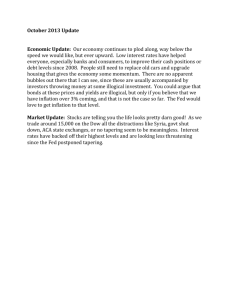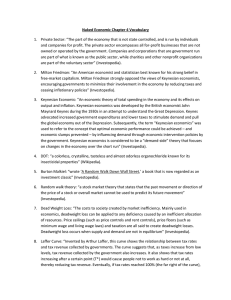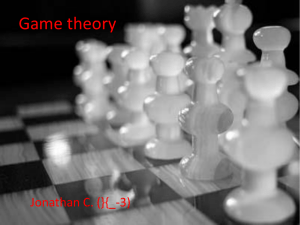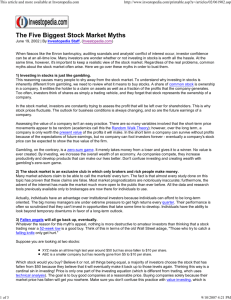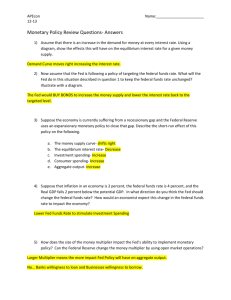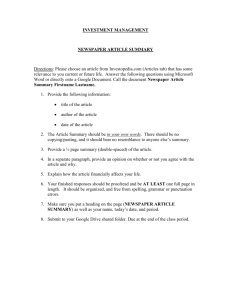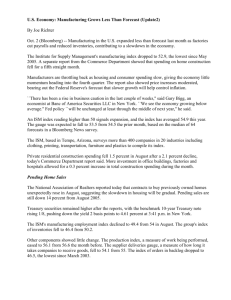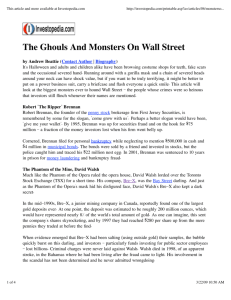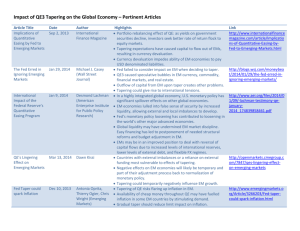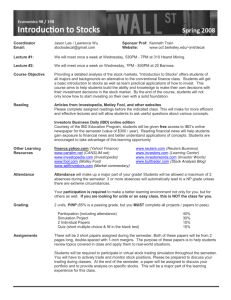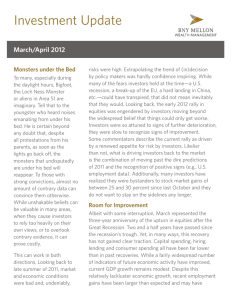The Stock Market Game™ Week In Review
advertisement
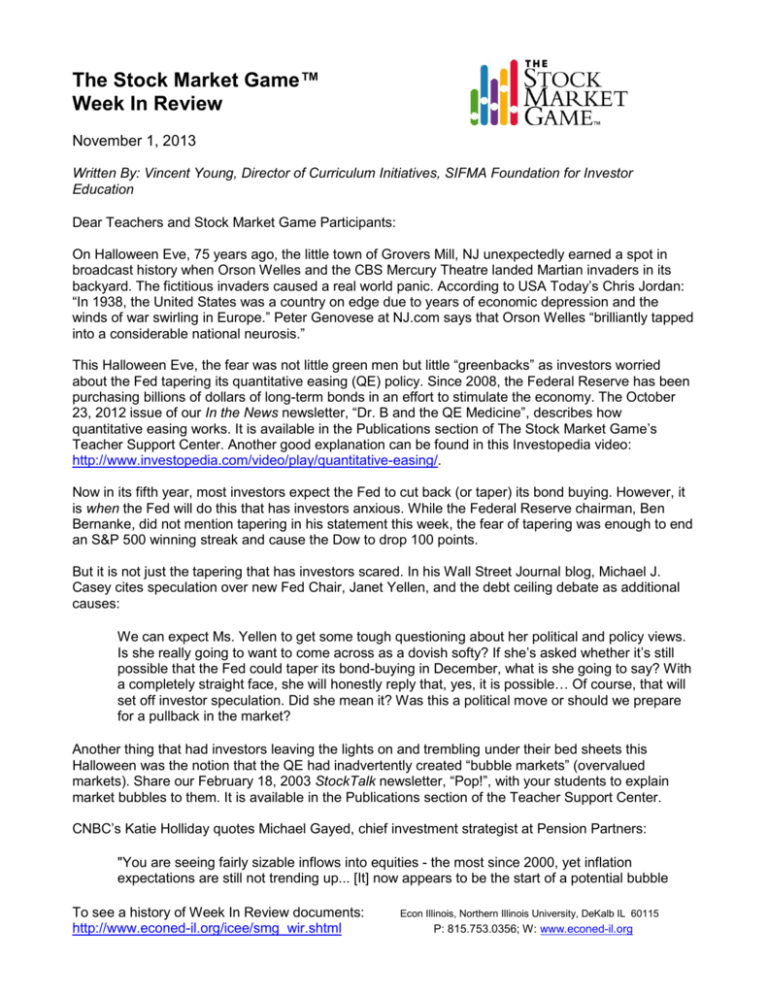
The Stock Market Game™ Week In Review November 1, 2013 Written By: Vincent Young, Director of Curriculum Initiatives, SIFMA Foundation for Investor Education Dear Teachers and Stock Market Game Participants: On Halloween Eve, 75 years ago, the little town of Grovers Mill, NJ unexpectedly earned a spot in broadcast history when Orson Welles and the CBS Mercury Theatre landed Martian invaders in its backyard. The fictitious invaders caused a real world panic. According to USA Today’s Chris Jordan: “In 1938, the United States was a country on edge due to years of economic depression and the winds of war swirling in Europe.” Peter Genovese at NJ.com says that Orson Welles “brilliantly tapped into a considerable national neurosis.” This Halloween Eve, the fear was not little green men but little “greenbacks” as investors worried about the Fed tapering its quantitative easing (QE) policy. Since 2008, the Federal Reserve has been purchasing billions of dollars of long-term bonds in an effort to stimulate the economy. The October 23, 2012 issue of our In the News newsletter, “Dr. B and the QE Medicine”, describes how quantitative easing works. It is available in the Publications section of The Stock Market Game’s Teacher Support Center. Another good explanation can be found in this Investopedia video: http://www.investopedia.com/video/play/quantitative-easing/. Now in its fifth year, most investors expect the Fed to cut back (or taper) its bond buying. However, it is when the Fed will do this that has investors anxious. While the Federal Reserve chairman, Ben Bernanke, did not mention tapering in his statement this week, the fear of tapering was enough to end an S&P 500 winning streak and cause the Dow to drop 100 points. But it is not just the tapering that has investors scared. In his Wall Street Journal blog, Michael J. Casey cites speculation over new Fed Chair, Janet Yellen, and the debt ceiling debate as additional causes: We can expect Ms. Yellen to get some tough questioning about her political and policy views. Is she really going to want to come across as a dovish softy? If she’s asked whether it’s still possible that the Fed could taper its bond-buying in December, what is she going to say? With a completely straight face, she will honestly reply that, yes, it is possible… Of course, that will set off investor speculation. Did she mean it? Was this a political move or should we prepare for a pullback in the market? Another thing that had investors leaving the lights on and trembling under their bed sheets this Halloween was the notion that the QE had inadvertently created “bubble markets” (overvalued markets). Share our February 18, 2003 StockTalk newsletter, “Pop!”, with your students to explain market bubbles to them. It is available in the Publications section of the Teacher Support Center. CNBC’s Katie Holliday quotes Michael Gayed, chief investment strategist at Pension Partners: "You are seeing fairly sizable inflows into equities - the most since 2000, yet inflation expectations are still not trending up... [It] now appears to be the start of a potential bubble To see a history of Week In Review documents: http://www.econed-il.org/icee/smg_wir.shtml Econ Illinois, Northern Illinois University, DeKalb IL 60115 P: 815.753.0356; W: www.econed-il.org given how far U.S. equities have diverged from the underlying economy, inflation expectations and the overall reality of where we are in the economic cycle." Among the warning signs of a bubble, Gayed points out “the recent poor performance of U.S. small caps, strong appetite for defensive sectors and the fact that bond yields were not rising in a way that suggests the stock market is right about the future." However, Holliday points out that Gayed also told CNBC that the Fed's "power of words" which has been demonstrated by the huge impact its use of the word 'taper' has had on markets could give the central bank the ability to prevent a severe correction. Do you share Gayed’s faith in the “power of words”? If a market correction (a situation where according to Investopedia “a stock, bond, commodity or index to adjust for an overvaluation.”) occurs, will the Fed’s choice of vocabulary be able to taper the severity of it? We saw how powerful words could be in 1938 when a radio show caused panic in the Grovers Mill. Sources: USA Today: http://www.usatoday.com/story/news/nation/2013/10/29/war-of-the-worlds-75thanniversary-new-jersey/3306975/ NJ.com: http://www.nj.com/entertainment/index.ssf/2013/10/mars_attacks_75th_anniversary_of_orson_wells_i nfamous_war_of_the_worldsbroadcast.html Wikipedia (Greenback): http://en.wikipedia.org/wiki/United_States_Note Investopedia (QE): http://www.investopedia.com/video/play/quantitative-easing/ Yahoo! Finance: http://finance.yahoo.com/news/fed-keeps-pumping-keep-economy-180020708.html Wall Street Journal: http://blogs.wsj.com/moneybeat/2013/10/30/the-markets-december-taper-fear-isonly-going-to-get-worse/ Bloomberg: http://www.bloomberg.com/news/2013-10-30/u-s-stocks-drop-as-fed-continues-stimulusamid-economic-growth.html Bloomberg (Bubble-Market): http://www.bloomberg.com/news/2013-10-29/blackrock-s-fink-saysthere-are-bubble-like-markets-again-1-.html Yahoo! Finance: http://finance.yahoo.com/news/markets-risk-1999-style-fed-033523687.html http://youtu.be/s_3LiMDpM3s Yahoo! Finance (Daily Ticker): http://finance.yahoo.com/blogs/daily-ticker/no-fed-taper-no-marketbubbles-either-jefferies-160752773.html Investopedia (Correction): http://www.investopedia.com/terms/c/correction.asp To see a history of Week In Review documents: http://www.econed-il.org/icee/smg_wir.shtml Econ Illinois, Northern Illinois University, DeKalb IL 60115 P: 815.753.0356; W: www.econed-il.org
